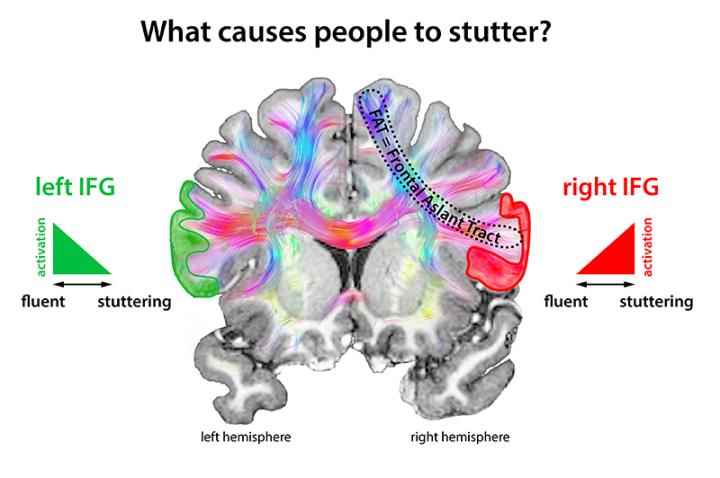While the average American might not come across it on a daily basis, stuttering is a relatively common condition. So when you think about it, it's interesting that we don't know more about this speech impediment, and specifically what causes it.
But German researchers say they have "gained crucial insights," as to the inner-workings of the brain and how the problem manifests itself. This gives the scientific world one more piece to the puzzle. The puzzle is far from complete, at which time we'd arrive at a definitive course of action to correct stuttering, which experts say affects 1 in 100 adult Americans and 5 percent of all children for stretches of at least six months. But today, these scientists believe we're now one step closer to the puzzle's completion.
It's previously been determined that stuttering results from an imbalance of brain activity, where a region in the right hemisphere's frontal brain is more active than its counterpart on the left. But what remained unknown was the interplay between the two.
Previous studies were unable to discern whether the left side's "deficiency" allowed the right to become "dominant," or conversely, whether the hyperactivity of the right hemisphere was the driving force in allowing it to overshadow the left. But that mystery has now been solved.
Using magnetic resonance imaging on their subjects, these researchers learned that a part of the hyperactive right hemisphere – known specifically as the inferior frontal gyrus, or IFG – is, in essence, overbearing and disruptive, obstructing the left's ability to function properly.
 A portion of the right IFG is "particularly active when we stop actions, such as hand or speech movements", according to the study's first author Nicole Neef, a neuroscientist with the Max Planck Institute for Human Cognitive and Brain Sciences in Leipzig, Germany (which provided the adjacent image of the brain). "If this region is overactive, it hinders other brain areas that are involved in the initiation and termination of movements. In people who stutter, the brain regions that are responsible for speech movements are particularly affected."
A portion of the right IFG is "particularly active when we stop actions, such as hand or speech movements", according to the study's first author Nicole Neef, a neuroscientist with the Max Planck Institute for Human Cognitive and Brain Sciences in Leipzig, Germany (which provided the adjacent image of the brain). "If this region is overactive, it hinders other brain areas that are involved in the initiation and termination of movements. In people who stutter, the brain regions that are responsible for speech movements are particularly affected."
The study, titled "Structural connectivity of right frontal hyperactive areas scales with stuttering severity," was published Dec. 8 in the journal Brain, A Journal of Neurology.
"NO single factor has been shown to be THE cause of stuttering," states the National Stuttering Association, adding that it's "not a psychological problem (though it can have psychological consequences)" and that the condition "tends to run in families, and recent research appears to indicate a genetic link for at least some individuals."
Meanwhile, of those affected by stuttering 80 percent are male, while overall more than 3 million Americans are afflicted, according to The Stuttering Foundation. On its website, the organization, which was established in 1947, writes that "four factors most likely to contribute to the development of stuttering: genetics ... child development ... neurophysiology ... and family dynamics."
The Institute's news release of the study's findings did not state how the hyperactivity of the right IFG can be corrected. But by identifying the brain's influential area, this study provides a more precise location for the scientific community to search for that elusive cure.




